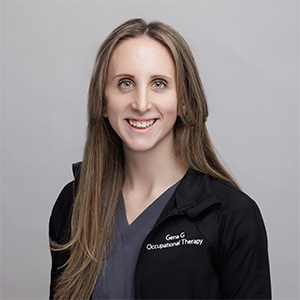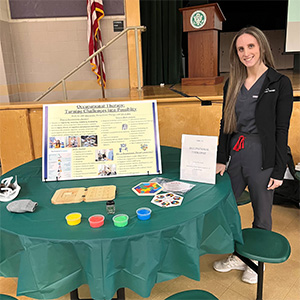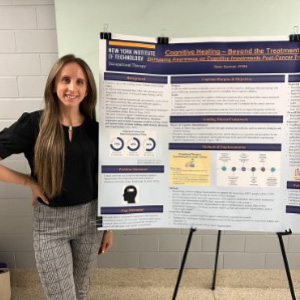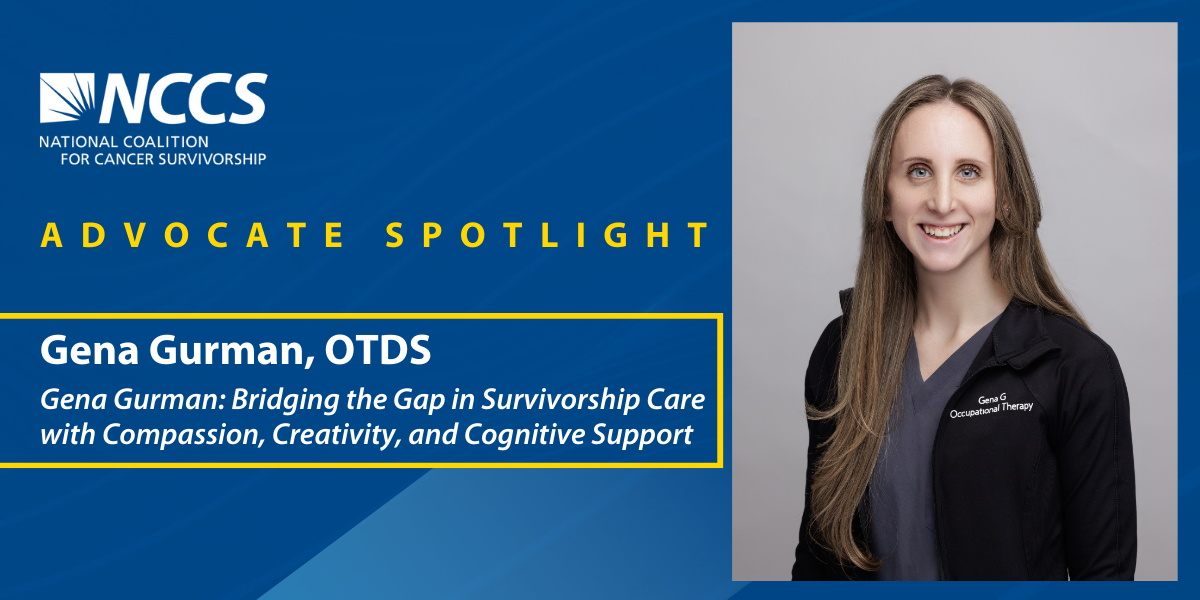Gena Gurman: Bridging the Gap in Survivorship Care with Compassion, Creativity, and Cognitive Support
Advocate Spotlight: Gena Gurman

When Gena Gurman, OTDS reflects on her path to occupational therapy, she doesn’t start with textbooks or lectures—she starts with her grandfather. A quiet, loving presence in her life, he battled bone and prostate cancer alongside dementia.
Through the challenges, Gena witnessed a powerful transformation when he received occupational therapy: he didn’t just regain function — he regained fragments of identity, autonomy, and joy. That experience lit a lifelong spark.
“It was in those moments—seeing the impact of personalized, compassionate care—that I discovered the beauty of occupational therapy,” she shared.

Gena with her grandfather.
Now completing her doctoral work in occupational therapy, Gena chose to focus her capstone project on cancer survivorship. Her mission: to shine a light on one of the lesser-known, often unaddressed consequences of cancer treatment—cognitive impairment—and to equip survivors with tools to better understand and navigate these challenges.
Gena’s motivation is deeply personal, but her vision is resolutely forward-looking. In her training, she quickly recognized a major gap in survivorship care: the lingering cognitive effects of treatment often go unrecognized or misunderstood—not only by survivors themselves, but by caregivers, educators, employers, and even some health professionals.
“Cognition is essential for performing daily activities,” Gena explained. “When these cognitive challenges persist or emerge after treatment, survivors can struggle to fully return to work, school, or social life. And too often, those struggles are invisible.” She wanted to do more than simply study this issue—she wanted to be part of the solution.
As she searched for an internship site, Gena discovered the National Coalition for Cancer Survivorship (NCCS). Our survivor-led model and unwavering commitment to quality care immediately resonated. “I knew I could learn from people who had lived it—people advocating not just for better treatment, but for better lives after cancer.”
Under the mentorship of Dr. Veronika Panagiotou, NCCS’s Director of Advocacy and Programs, Gena dove into research and development, collaborating with survivors and professionals alike to create an online resource that would be both evidence-based and practical. The result? A new tool designed to help survivors, caregivers, clinicians, and others understand and address cancer-related cognitive changes.

Her final product — “Cognition After Cancer: A Rehabilitation Resource for Survivors” — is now live on the NCCS website and freely available to the public. Explore the resource here »
The resource includes a breakdown of cognitive symptoms, guidance for self-advocacy, an introduction to the role of occupational therapy in cancer care, and even engaging brain-training tools and strategies that survivors can begin using on their own. Feedback from NCCS advocates and professionals helped shape the final version into a survivor-friendly, empowering guide. “I hope this helps individuals feel better prepared to reenter daily life after cancer treatment—whether that’s going back to work, school, or simply reclaiming their routines,” Gena said.
Her experience at NCCS also opened her eyes to the power of advocacy beyond the clinic. “I love patient care, but this experience showed me that I can also make a difference on a policy level—advocating for increased access to services like occupational therapy.”
As she prepares to graduate and take her national certification exam, Gena is looking ahead to a career that blends direct care with advocacy. She hopes to continue her education in cognition and become a Certified Neurologist Specialist, while always centering the humanity behind every diagnosis.

One of the most powerful lessons she’ll carry with her came from a conversation during her time at NCCS: the importance of self-advocacy. “Many healthcare professionals are incredibly knowledgeable, but they may unintentionally overlook the nuanced aspects of a person’s experience,” she said. “Empowering individuals to speak up and trust what they know about their own bodies can significantly improve the care they receive. I want to help foster that voice in every person I work with.”
Gena offers these words to live—and practice—by to others entering healthcare or survivorship support roles: “Never underestimate the power of presence and compassion. Clinical skills are essential, but what often leaves the most lasting impact is how you make someone feel—heard, seen, and supported.” Gena’s capstone project may have concluded, but her impact is just beginning. Through her thoughtful approach to survivorship care and her commitment to meeting survivors where they are, she has helped fill a critical gap in post-treatment support. At NCCS, we are honored to have partnered with Gena and look forward to seeing how she continues to shape a more compassionate, inclusive future for cancer care.
Learn more about NCCS’s CPAT program for advocates and join for free.




